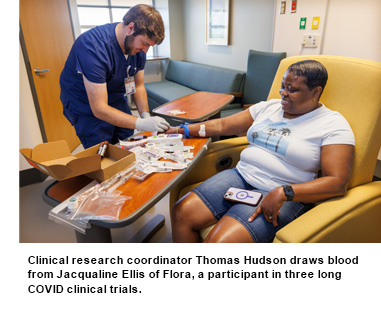Clinical trials lead to discovery
Good morning!
Today, I want to shine a light on one of the many areas that makes us an asset to our patients and to the state of Mississippi – clinical trials.
At UMMC, our research spans the spectrum from basic science all the way to implementation science, including the advancement of new diagnostic and treatment technologies via clinical trials. Our research enterprise is what makes UMMC unlike any other health care institution in Mississippi.
The links that move lab studies to advanced practice, clinical trials investigate new tests and treatments and evaluate their effects in patient volunteers. These trials bring medical interventions, devices, surgical and radiological procedures and new medications to patients who, in some cases, are desperate for new treatments or even cures.
Multiple UMMC offices are involved in turning ideas into discoveries. Clinical research support infrastructure including the Office of Clinical Trials, the Institutional Review Board, the Institutional Biosafety Committee, the Radiation Safety Committee, the Clinical Research Support Program, the Clinical Research and Trials Unit and the Research Pharmacy work in concert with the doctors, scientists, nurses, coordinators and other staff conducting trials. These offices and our research teams work closely with the federal entities that regulate clinical trials, such as HHS, NIH, the FDA and others, depending on the trial.
 Since clinical trials, which include multiple phases, involve people – someone’s mother, someone’s grandfather or someone’s child – the utmost care is taken to, first, do no harm. Phase I studies typically test new drugs for the first time in a small cohort of participants to evaluate safety and identify side effects.
Phase II studies test for efficacy while continuing to measure safety among a larger group of participants.
Since clinical trials, which include multiple phases, involve people – someone’s mother, someone’s grandfather or someone’s child – the utmost care is taken to, first, do no harm. Phase I studies typically test new drugs for the first time in a small cohort of participants to evaluate safety and identify side effects.
Phase II studies test for efficacy while continuing to measure safety among a larger group of participants.
Larger populations from different regions take part in Phase III trials, which are often the step before a new treatment is approved. Phase IV trials take place after approval to provide further testing in a larger population over a longer time frame.
The Medical Center has about 200 clinical trials underway at any time, and they run the gamut. Some are testing innovative new treatments or devices. Other clinical trials test existing treatments used in different treatment plans. Observational clinical trials analyze data to determine efficacy.
We are the lead research agency for some of our trials, and in others, we are a participating site for a study led by another institution or agency.
Clinical trials touch every part of UMMC, and for each study, there are a lot of moving parts. For example, a clinical trial involving MRIs might involve interventional radiology, pharmacy if an injection is used, biosafety if blood is drawn, the Office of Information Security and Division of Information Systems if participants share their personal information on a UMMC tablet, compliance and legal services, in addition to research support services, the principal investigators and study teams.
For UMMC to continue to be a leader in academic medicine, we must develop the best care through innovative medicine. Clinical trials are an integral part of that research mission.
The result of the scores of UMMC clinical trials is often a higher level of care, treatments that allow our patients to live better lives and, sometimes, save lives. Reaching beyond the laboratory to translate research into care is an important way UMMC is working toward A Healthier Mississippi.



